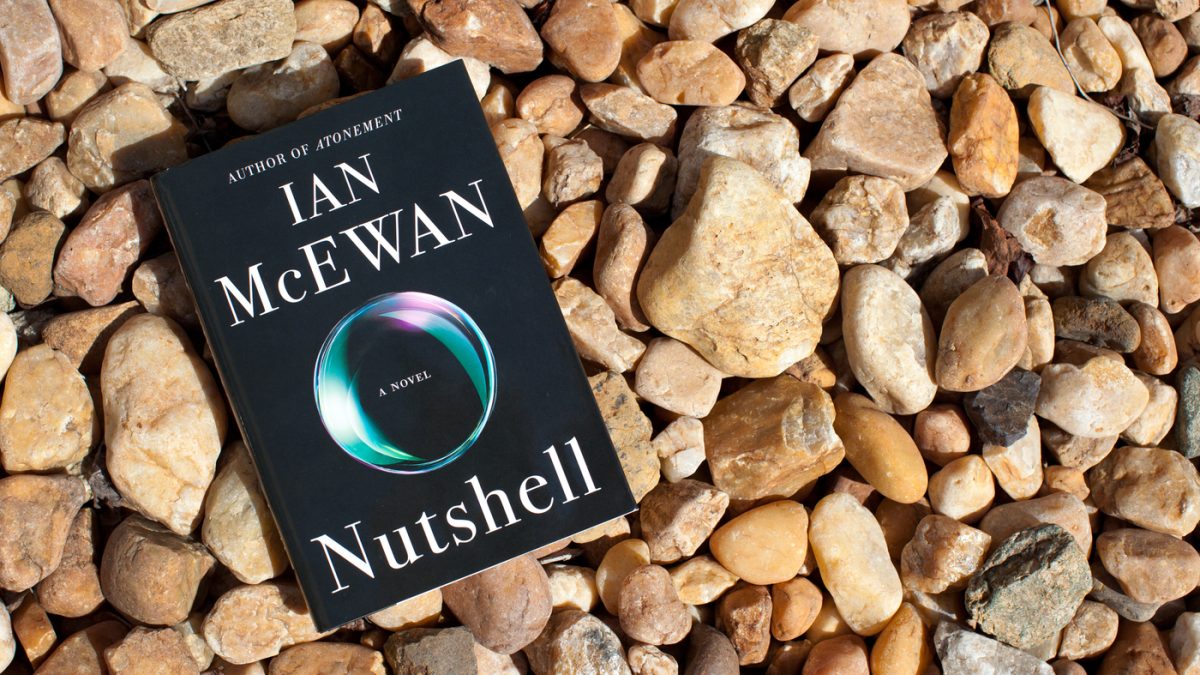If you’ve ever read Hamlet and thought to yourself, “wow, Hamlet sure is moody! I wish he was actually a sentient fetus with refined alcohol tastes who has genius-level intelligence and talks like David Caraway,” then boy, do I have the book for you!
At the recommendation of our very own Mrs. Hall, I picked up Nutshell by Ian McEwan this past week. McEwan was inspired to write this by the Hamlet quote: “O God, I could be bounded in a nutshell and count myself a king of infinite space.” It’s a short book–novella length and with a simple plot–but I can truthfully say it’s like no book I’ve ever read before. It vaguely reminds me of The Metamorphosis, but even Kafka would have been weirded out by this one.
It’s a psychological drama drenched in a thick layer of irony and surrealism; it’s like Maggie O’Farrell’s Hamnet, if Hamnet wasn’t mid. (If I can make a modest proposal here, it should replace Hamnet as senior year summer reading.)
As I said before, the book is a reimagining of Hamlet. (In case you didn’t know, Hamlet is the play we’re putting on this November, starring one Connor Davis as our lead. There are three shows–November 9th, 10th, and 11th. Go see it!) It has the same central plot points. The titular character’s father is betrayed and murdered by his own brother, who then marries the father’s former wife. However, this one is set in modern-day Britain, and Hamlet in this case is a nine-month-old fetus living in his mother’s womb. And he doesn’t need a ghost to tell him about the fact that his uncle killed his father–he heard it from the womb. You can’t fool him–after all, he wasn’t born yesterday.
A standout element was the characterization of Claude (Claudius, Hamlet’s uncle) and Trudy (Gertrude, Hamlet’s mother.) They are indisputably the villains of the novel but are described perfectly as boring and uninspired. Their dialogue (even about murder) is so mundanely realistic that they feel like real people. It brings to mind the phrase “the banality of evil.” They see the murder as something that must be done, but they know there’s no grand philosophy or motivation behind it. They’re not Raskolnikov. They really just don’t like Hamlet’s dad.
The fetus is…interesting. His narration is halfway between a cynical old British man and the historical tangents of Dr. Caraway. (Note: though the book is narrated by a sentient fetus, it isn’t a commentary on abortion–it never comes up in the novel.) However, to name a few topics, he comments on: Italian wine, psychology, modern liberal thought and culture wars, motherhood, philosophy, British foreign policy, and the geopolitical state of the Middle East. (Why does a fetus know about the geopolitical state of the Middle East? I’ll do you one better: What the hell is this book?)
It requires a complete suspension of disbelief to read. But once disbelief is suspended a thousand miles above the railroad track, you will welcome the speeding, sentient fetus-Hamlet-train with open arms and a liberated mind. That previous sentence is quite similar to the book’s prose style.
It’s primarily a drama and character study, but the book’s humor is as absurd as the concept. I laughed out loud multiple times. I was invested. I was appalled. I put down the book multiple times and stared at the wall, wondering “what the hell am I reading?” I was disappointed by the ending. I was greatly entertained, though I probably wouldn’t read it again.
I was bounded in a nutshell and, for an hour, counted myself a king of infinite space. I urge you to do the same.


